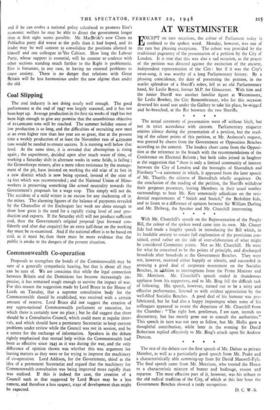Commonwealth Co-operation
Proposals to strengthen the bonds of the Commonwealth may be sure of a generally sympathetic hearing, but that is about all they can be sure of. We are conscious that while the legal connection between Britain and the Dominions has become increasingly im- precise, it has remained tough enough to survive the impact of war. For this reason the suggestion made by Lord Bruce in the House of Lords on Tuesday, that a supreme consultative body for the Commonwealth should be established, was received with a certain amount of reserve. Lord Bruce did not suggest the creation of any supra-national Commonwealth parliament or executive, for which there is certainly now no place ; but he did suggest that there should be a Consultative Council, which could meet at regular inter- vals, and which should have a permanent Secretariat to keep current problems under review while the Council was not in session, and be a centre for the exchange of information. Speakers in the debate rightly emphasised that mutual help within the Commonwealth had been as effective since 1945 as it was during the war, and the only difference of opinion shown was whether this was argument for leaving matters as they were or for trying to improve the machinery of co-operation. Lord Addison, for the Government, shied at the idea of a permanent Secretariat and argued that the machinery for Commonwealth consultation was being improved more rapidly than was realised. If this is indeed the case, the creation of a Council such as that suggested by Lord Bruce may be a less remote, and therefore a less suspect, stage of development than might be expected.






























 Previous page
Previous page